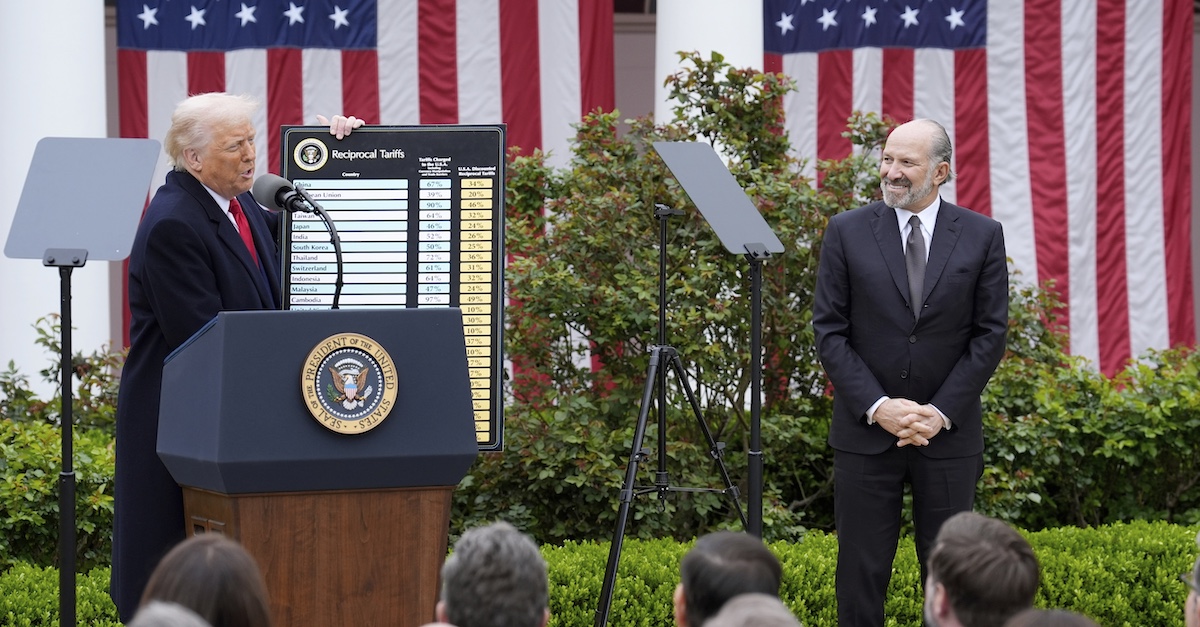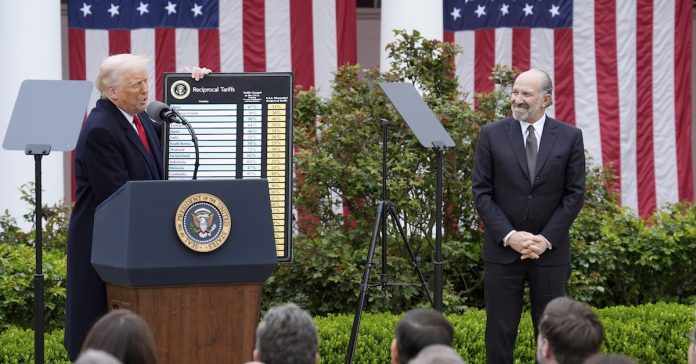
U.S. President Donald Trump delivers remarks on tariffs as U.S. Commerce Secretary Howard Lutnick stands nearby in the Rose Garden at the White House in Washington, D.C. (Stringer / Sputnik via AP).
Fresh off oral arguments before a full panel of largely skeptical appellate judges, the DOJ has filed a supplemental authority letter darkly warning that a stay is needed to avoid another Great Depression should the court ultimately decide that President Donald Trump”s unilaterally imposed emergency tariffs were unlawful.
The letter, submitted Monday to the U.S. Court of Appeals for the Federal Circuit by former Trump attorney and current U.S. Solicitor General D. John Sauer, contends that the imposition of tariffs revived a “dead country” and that the judiciary would plunge America into “1929-style” crisis if it reverses the president’s agenda, even as critics have warned that the tariffs themselves are what are reminiscent of the Great Depression.
Also a signatory to the letter was Assistant Attorney General Brett Shumate of the DOJ’s civil division, who argued the appeal from the U.S. Court of International Trade (CIT). The lower court’s decision found that Trump’s sweeping tariffs imposed under the International Emergency Economic Powers Act (IEEPA) in a stated effort to combat drug smuggling were “unlawful” and set aside.
The update-by-letter from the DOJ appears to largely echo the president’s Truth Social post on tariffs last week, where he claimed a “Radical Left Court” could be on the verge of presiding over a “judicial tragedy” were it to rule against him.
— Rapid Response 47 (@RapidResponse47) August 8, 2025
“It would be 1929 all over again, a GREAT DEPRESSION!” Trump posted.
The letter also appears designed to support its in-court description of drug-trafficking tariffs as a legally sound bargaining chip for leverage so Trump could address the trade deficit national emergency he identified.
“On July 27, after stating his intention to impose IEEPA tariffs, President Trump announced the largest trade agreement in history with the 27-nation European Union, America’s most significant trading partner,” the letter began, before reiterating a demand for a stay in the event that the appellate court affirms the lower court. “President Trump entered historic agreements with Indonesia, the Philippines, and Japan on July 22; and with the United Kingdom on May 8.”
“These agreements support our request for a stay if the Court affirms,” the DOJ continued, before the letter took a turn.
The DOJ warned that if the court entertains “suddenly revoking” Trump’s “tariff authority under IEEPA” — which it may do by agreeing he has no such authority — and does not issue a stay along with such an adverse ruling, then there would be “catastrophic consequences for our national security, foreign policy, and economy.”
John Sauer says that if the US had to pay back all the taxes it illegally collected from consumers, it might ruin the country.
storage.courtlistener.com/recap/gov.us…
— emptywheel (@emptywheel.bsky.social) August 11, 2025 at 12:49 PM
This is a letter signed by the US government’s top lawyer and submitted today in federal court (in VOS Selections v Trump). I’m honestly struggling to believe it’s real, but here we are. pic.twitter.com/Hb5L8bMeL5
— Scott Lincicome (@scottlincicome) August 11, 2025
This is such a nonsense letter. https://t.co/Z9qEngILlY
— Raffi Melkonian (@RMFifthCircuit) August 11, 2025
Also on the list of possibilities for the U.S. is “financial ruin,” turning America into a “dead country” again as it was “[o]ne year ago,” and mass homelessness and joblessness, the government claimed. From the letter:
There is no substitute for the tariffs and deals that President Trump has made. One year ago, the United States was a dead country, and now, because of the trillions of dollars being paid by countries that have so badly abused us, America is a strong, financially viable, and respected country again. If the United States were forced to pay back the trillions of dollars committed to us, America could go from strength to failure the moment such an incorrect decision took effect.
These deals for trillions of dollars have been reached, and other countries have committed to pay massive sums of money. If the United States were forced to unwind these historic agreements, the President believes that a forced dissolution of the agreements could lead to a 1929-style result. In such a scenario, people would be forced from their homes, millions of jobs would be eliminated, hard-working Americans would lose their savings, and even Social Security and Medicare could be threatened. In short, the economic consequences would be ruinous, instead of unprecedented success.
The CIT ruled in May that the IEEPA did not actually “confer” the “unbounded authority” Trump claimed to have, because the Constitution “assigns Congress the exclusive powers to ‘lay and collect Taxes, Duties, Imposts and Excises,’ and to ‘regulate Commerce with foreign Nations.'”
Love true crime? Sign up for our newsletter, The Law&Crime Docket, to get the latest real-life crime stories delivered right to your inbox.
Before appellate arguments, the DOJ stressed that the decision was an “unprecedented and legally indefensible injunction permanently barring the United States from implementing tariffs involving dozens of countries, from the United Kingdom to the People’s Republic of China to the European Union—tariffs that are central to the President’s foreign-policy and economic agendas.”
During arguments, Shumate acknowledged the president’s action itself was unprecedented, as it was the “first time” the IEEPA had been used for tariffs in roughly 50 years of the statute’s existence. When at least one of the judges took note that the IEEPA “doesn’t mention the word tariffs” or duties “anywhere,” the DOJ attorney responded: “I don’t think that’s unusual.”
“What do you mean it’s not unusual?” the astounded judge responded. “It is very unusual in a trade framework.”
“[IEEPA] didn’t need to specifically use the word tariffs,” Shumate answered, saying the words “regulate importation” in IEEPA must mean that at least some tariffs are authorized.
Other jurists were skeptical that Trump could “rewrite the tariff schedule” as part of an emergency declaration with presidential determinations underpinning it that are at most unreviewable by the courts or at least subject to “broad deference.”

